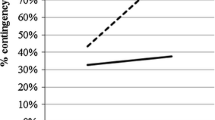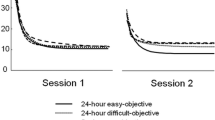Abstract
The effects of a social skill training program on socially isolated children are reported. The training program was derived from the results of a previous study of the specific social skills that discriminated popular from unpopular children. Training effects in the present investigation were assessed on sociometric position, and on the quality, frequency, and distribution of social interaction to peers. Time-series analyses were performed on the frequency and distribution of peer interaction. Two isolated children received social skill training with an adult coach, and two isolated children spent an equivalent amount of time with an adult. Results indicated that socially isolated children in the treatment group changed significantly in sociometric position on a follow-up assessment 9 weeks after the end of the intervention, did not change in the total frequency of peer social interaction, but did redistribute their interaction to peers. The two isolated children who did not receive the treatment program did not change significantly on the total frequency of peer interaction, and tended to withdraw from peers rather than redistribute their interaction. The insensitivity of total peer interaction frequency as a measure of outcome was discussed.
Similar content being viewed by others
References
Amidon, E., & Hoffman, C. B. Can teachers help the socially rejected?The Elementary School Journal, 1965,66,(3), 194–154.
Asher, S. R., Oden, S. L., & Gottman, J. M. Children's friendships in school settings. In L. G. Katz (Ed.),Current topics in early childhood education (Vol. 1). Hillsdale, New Jersey: Erlbaum (in press).
Asher, S. R., & Parke, R. D. Influence of sampling and comparison processes on the development of communication effectiveness.Journal of Educational Psychology, 1975,67,(1), 64–75.
Box, G. E. P., & Jenkins, G. M.Time-series analysis: Forecasting and control. San Francisco: Holden Day, 1970.
Chennault, M. Improving the social acceptance of unpopular educable mentally retarded pupils in special classes.American Journal of Mental Deficiency, 1967,72, 455–458.
Cowen, E. L., Pederson, A., Babigian, H., Izzo, L. D., & Trost, M. A. Long term follow-up of early detected vulnerable children.Journal of Consulting and Clinical Psychology, 1973,41, 438–446.
Evers, W. L., & Schwarz, J. C. Modifying social withdrawal in preschoolers: The effects of filmed modeling and teacher praise.Journal of Abnormal Child Psychology, 1973,1, 248–256.
Glass, G. V. Willson, V. K., & Gottman, J. M.The design and analysis of time-series experiments. Boulder, Colorado: Colorado University Associated Press, 1975.
Goldsmith, J. B., & McFall, R. M. Development and evaluation of an interpersonal skill-training program for psychiatric inpatients.Journal of Abnormal Psychology, 1975,84, 51–58.
Gottman, J. M. N-of-one and N-of-two research in psychotherapy.Psychological Bulletin, 1973,80, 93–105.
Gottman, J., Gonso, J., & Rasmussen, B. Social interaction, social competence and friendship in children.Child Development, 1975,46, 709–718.
Gottman, J. M., McFall, R. M., & Barnett, J. T. Design and analysis of research using time-series.Psychological Bulletin, 1969,72, 299–306.
Hartup, W. W., Glazer, J. A., & Charlesworth, R. Peer reinforcement and sociometric status.Child Development, 1967,38, 1017–1024.
Keller, M. F., & Carlson, P. M. The use of symbolic modeling to promote social skills in preschool children with low levels of social responsiveness.Child Development, 1914,45, 912–919.
Kranzler, G. D., Mayer, G. R., Dyer, C. O., & Munger, P. F. Counseling with elementary school children: An experimental study.The Personal and Guidance Journal, 1966,44, 944–949.
Lipinski, D., & Nelson, R. Problems in the use of naturalistic observation as a means of behavioral assessment.Behavior Therapy, 1974,5, 341–351.
McFall, R. M., & Twentyman, C. T. Four experiments on the relative contribution of rehersal, modeling, and coaching to assertion training.Journal of Abnormal Psychology, 1973,81, 199–218.
Meichenbaum, D. H., & Goodman, J. Training impulsive children to talk to themselves: A means for developing self-control.Journal of Abnormal Psychology, 1971,77, 115–126.
O'Connor, R. D. Modification of social withdrawal through symbolic modeling.Journal of Applied Behavior Analysis, 1969,2, 15–22.
O'Connor, R. D. The relative efficacy of modeling, shaping, and the combined procedures for the modification of social withdrawal.Journal of Abnormal Psychology, 1972,79, 327–334.
O'Leary, K. D., & Kent, R. Behavior modification for social action: Research tactics and problems. In L. A. Hamerlynck, L. C. Handy, & E. J. Mash (Eds.),Behavior change: Methodology, concepts and practice: The Fourth Banff International Conference on Behavior Modification. Champaign, Illinois: Research Press, 1973.
Reid, J. B. Reliability assessment of observational data: A possible methodological problem.Child Development, 1970,41, 1143–1150.
Roff, M. Childhood social interactions and young adult bad conduct.Journal of Abnormal and Social Psychology, 1961,63, 333–337.
Roff, M., Sells, B., & Golden, M. M.Social adjustment and personality development in children. Minneapolis: The University of Minnesota Press, 1972.
Rucker, C. N., & Vincenzo, F. M. Maintaining social acceptance gains made by mentally retarded children.Exceptional Children, 1970,36, 679–680.
Thomson, C., Holmberg, M., & Baer, D. M. A brief report on a comparison of time-sampling procedures.Journal of Applied Behavior Analysis, 1974,7, 623–626.
Walker, H. M., & Hops, H. The use of group and individual reinforcement contingencies in the modification of social withdrawal. In L. A. Hamerlynck, L. C. Handy, & E. J. Mash (Eds.),Behavior change: Methodology, concepts and practice: The Fourth Banff International Conference on Behavior Modification. Champaign, Illinois: Research Press, 1973. pp. 269–307.
Author information
Authors and Affiliations
Rights and permissions
About this article
Cite this article
Gottman, J., Gonso, J. & Schuler, P. Teaching social skills to isolated children. J Abnorm Child Psychol 4, 179–197 (1976). https://doi.org/10.1007/BF00916521
Revised:
Issue Date:
DOI: https://doi.org/10.1007/BF00916521




